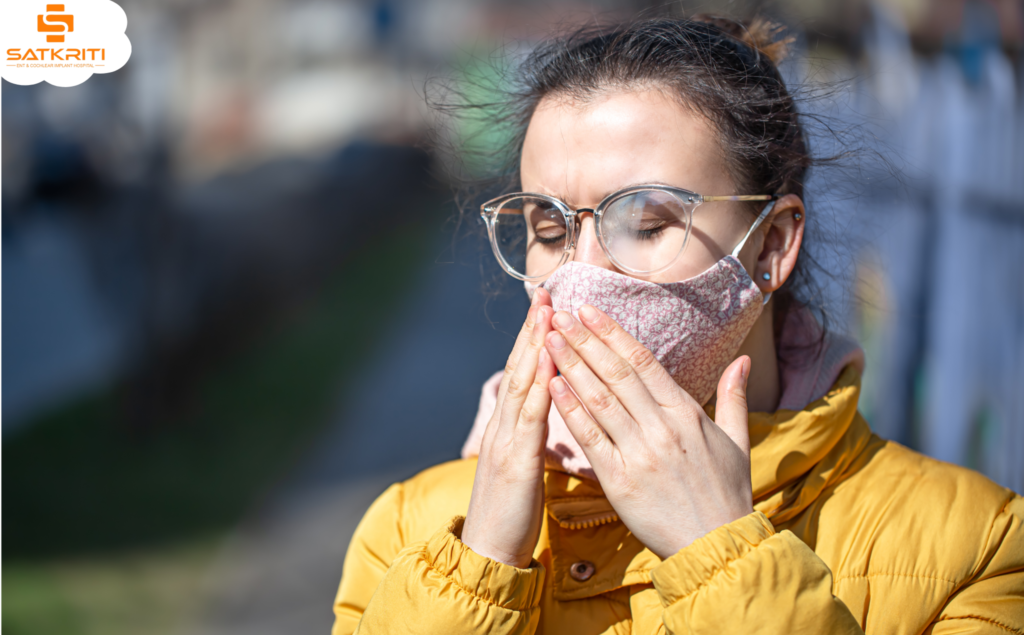
The air you breathe could silently harm your ear, nose, and throat (ENT) health. Rising pollution levels constantly expose our bodies to harmful particulate matter and chemicals that irritate and damage the delicate ENT pathways. From persistent throat irritation to sinus infections and allergic rhinitis, pollution doesn’t just affect your lungs—it leaves a major impact on your overall well-being.
Air pollution could be the hidden culprit if you’ve been experiencing unexplained congestion, frequent sore throats, or sinus headaches. How exactly does pollution trigger ENT disorders? And what can you do to protect yourself?
Continue reading to find out!
- Types of Pollution That Harm ENT Health
The following are the different types of pollution that can drastically impact your ENT health.
1. Air Pollution
- Particulate Matter (PM) – Tiny particles (PM2.5, PM10) can enter the airways, causing inflammation, sinus infections, and worsening conditions like asthma.
- Gaseous Pollutants – Harmful gases like carbon monoxide, nitrogen dioxide, and sulfur dioxide from traffic and industries can irritate the nose, throat, and lungs.
- Allergens – Pollen, dust, and mould spores in the air can trigger allergies, causing sneezing, congestion, and throat irritation.
- Occupational Hazards – Some workplaces expose workers to harmful chemicals and pollutants that can affect ENT health over time.
2. Noise Pollution
- Hearing Loss – Constant exposure to loud noises can damage the inner ear, leading to permanent hearing loss and tinnitus.
- Other Issues – Noise pollution can cause stress, communication difficulties, and sleep disorders.
3. Other Types of Pollution
- Water and land Pollution—Contaminants in water and soil release toxins into the air, indirectly affecting ENT health.
- Plastic Pollution – The burning or breakdown of plastics can release harmful chemicals, leading to respiratory problems.
- How Pollution Affects ENT Health
The air we breathe carries pollutants that can irritate the nose, throat, and ears, leading to discomfort and long-term conditions. Pollution is a hidden trigger for many ENT disorders, from persistent sore throats to hearing loss.
- Irritation and Inflammation – Pollutants like chemicals and particulate matter can inflame the delicate tissues of the nose, throat, and sinuses, causing dryness, swelling, and discomfort.
- Higher Risk of Infections – Pollution weakens the body’s natural defenses, making you more prone to bacterial and viral infections, including sinus infections and sore throats.
- Specific ENT Conditions:
- Throat Irritation leads to a scratchy throat, coughing, and dryness.
- Allergic Rhinitis – Pollution can trigger allergies, causing sneezing, congestion, and a runny nose.
- Sinusitis – Pollutants inflame the sinuses, leading to congestion and pain.
- Ear Infections – Respiratory infections linked to pollution can spread to the middle ear.
- Hearing Loss & Smell Disorders – Long-term exposure to pollutants can damage hearing and reduce the sense of smell.
3. Symptoms of ENT Issues Caused by Pollution
Here are some common symptoms to watch out for:
Nose and Sinuses
- Nasal Congestion: Blocked nose, making it hard to breathe.
- Post-Nasal Drip: Mucus dripping down the throat, causing irritation.
- Sinusitis: Pain, pressure, and thick nasal discharge due to inflamed sinuses.
- Allergic Rhinitis: Sneezing, itching, and congestion triggered by pollution.
- Nasal Polyps: Growths in the sinuses that can cause facial pressure and loss of smell.
Throat and Larynx
- Sore Throat: Constant irritation, dryness, or a scratchy feeling.
- Persistent Cough: A lingering cough that won’t go away.
- Laryngitis: Inflammation of the voice box leading to hoarseness.
Ears
- Hearing Loss: Difficulty hearing due to pollution exposure.
- Ear Infections: Inflammation from blocked Eustachian tubes.
- Tinnitus: Ringing or buzzing in the ears.
Other Symptoms
- Eye Irritation: Red, itchy, or watery eyes.
- Difficulty Breathing: Shortness of breath or wheezing.
- Fatigue & Headaches: Feeling tired and experiencing frequent headaches.
- Asthma & Sleep Apnoea: Worsening respiratory issues, often linked to air pollution.
Protecting your ENT health means reducing exposure to pollution and seeking medical help for persistent symptoms.
How to Protect Your ENT Health from Pollution
Pollution can cause serious ENT disorders, but you can protect your ENT health and breathe easier with a few simple steps.
- Stay Informed About Air Quality: Check air quality reports and limit outdoor activities on high-pollution days.
- Use Air Purifiers: Use of NSO Mask, Saline Nasal immigration, Steam inhalation.
- Maintain Humidity Levels: Keep indoor humidity balanced to prevent dryness and irritation.
- Stay Hydrated: Drinking plenty of water helps keep your throat and nasal passages moist.
- Lukewarm water gargles
- Avoid cold beverages
- Outside unhygienic food
- Ultra processes preserved food
- Practice Breathing Exercises: Deep breathing can strengthen your respiratory system and improve lung health.
- Use ear plugs in a noise environment.
Small changes can go a long way in preventing ENT disorders and keeping your ears, nose, and throat healthy!
The Silent Threat: How Pollution Contributes to ENT Disorders
Pollution is an invisible enemy, silently damaging our ENT health every day. From constant exposure to airborne toxins and allergens to the relentless impact of noise pollution, our ears, nose, and throat bear the brunt of these harmful elements. Whether it’s hearing loss, chronic sinus infections, or persistent throat irritation, pollution plays a major role in worsening ENT disorders.
But there’s no need to suffer in silence! At Satkriti Hospital, expert ENT specialists provide advanced diagnosis and world-class treatment for all ENT disorders. Whether you’re struggling with hearing loss, sinus issues, or throat infections, our team ensures personalised care and long-term relief. Equipped with cutting-edge technology and years of experience, Satkriti Hospital is your one-stop destination for complete ENT health solutions.
Don’t let pollution take control—trust the experts at Satkriti Hospital for the best care and lasting recovery!